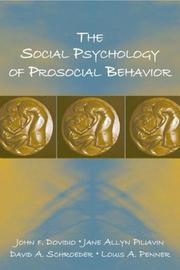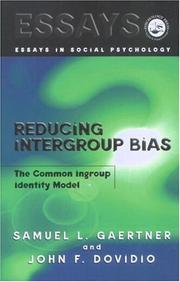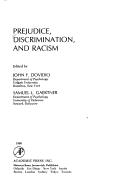| Listing 1 - 10 of 17 | << page >> |
Sort by
|
Book
ISBN: 9781412934534 1412934532 Year: 2010 Publisher: London: Sage,
Abstract | Keywords | Export | Availability | Bookmark
 Loading...
Loading...Choose an application
- Reference Manager
- EndNote
- RefWorks (Direct export to RefWorks)
Sociology of minorities --- Social psychology --- Prejudices. --- Stereotypes (Social psychology) --- Discrimination. --- Préjugés --- Stéréotypes --- Discrimination --- Prejudices --- #KVHB:Vooroordelen --- #KVHB:Stereotype --- #KVHB:Discriminatie --- 316.64 --- 316.647.82 --- 316.647.8 --- Maatschappelijke attitudes --(sociale psychologie) --- Discriminatie --(sociaalpsychologische aspecten) --- Beeldvorming. Etikettering. Sociaal stigma. Stereotype vooroordeel --- Sociale psychologie --- handboeken en inleidingen --- 316.647.8 Beeldvorming. Etikettering. Sociaal stigma. Stereotype vooroordeel --- 316.647.82 Discriminatie --(sociaalpsychologische aspecten) --- 316.64 Maatschappelijke attitudes --(sociale psychologie) --- Stereotypes (Social psychology). --- handboeken en inleidingen. --- Préjugés --- Stéréotypes --- Mental stereotypes --- Stereotype (Psychology) --- Stereotyping (Social psychology) --- Attitude (Psychology) --- Rigidity (Psychology) --- Bias (Psychology) --- Prejudgments --- Prejudice --- Prejudices and antipathies --- Emotions --- Bias --- Interpersonal relations --- Minorities --- Toleration

ISBN: 9780805849363 080584936X 9780805849356 0805849351 9781351540520 1351540521 9781351540506 1351540505 Year: 2006 Publisher: Mahwah, N.J. : Lawrence Erlbaum Associates,
Abstract | Keywords | Export | Availability | Bookmark
 Loading...
Loading...Choose an application
- Reference Manager
- EndNote
- RefWorks (Direct export to RefWorks)
Written by four leading researchers in the study of prosocial behavior, 'The Social Psychology of Prosocial Behavior' examines prosocial behavior from a new multilevel perspective that explores the diverse influences that promote actions for the benefit of others and the ways that prosocial actions can be manifested. The authors expand the breadth of the field, incorporating analyses of biological and genetic factors that predispose individuals to prosocial behavior. They identify both the common and the unique processes that underlie the broad spectrum of prosocial behavior. Each chapter begins with a question about prosocial behavior and ends with a summary that answers the question. The final chapter summarizes the questions and the answers that research provides. Conceptual models that elaborate on and extend the multilevel approach to prosocial behavior are used to tie these findings together. 'The Social Psychology of Prosocial Behavior' addresses the evolution of altruistic tendencies and other biological explanations of why humans are predisposed to be prosocial; how the situation and motives that are elicited by these situations affect when and how people help; the causes and maintenance of long-term helping, such as volunteering; how prosocial behavior changes over time and the developmental processes responsible for these changes; the consequences of helping for both the people who provide it and those who receive it; and helping and cooperation within and between groups and the implications of these actions. ' 'This accessible text is ideal for advanced courses on helping and altruism or prosocial behavior, taught in psychology, sociology, management, political science, and communication, or for anyone interested in learning more about prosocial behavior in general.
Helping behavior. --- Social psychology. --- Comportement d'aide --- Psychologie sociale --- Helping behavior --- Social psychology
Book
ISBN: 1784025402 1446200914 1446246108 1282240994 9786613812186 1446248380 9781784025403 9781446200919 9781446246108 9781282240995 9781446248386 Year: 2010 Publisher: London : SAGE,
Abstract | Keywords | Export | Availability | Bookmark
 Loading...
Loading...Choose an application
- Reference Manager
- EndNote
- RefWorks (Direct export to RefWorks)
This title provides comprehensive coverage on the state of research, critical analysis and promising avenues for further study on prejudice, stereotyping and discrimination.
Prejudices. --- Stereotypes (Social psychology) --- Discrimination.

ISBN: 0863775713 Year: 2000 Publisher: Philadelphia (Pa) Psychology Press
Abstract | Keywords | Export | Availability | Bookmark
 Loading...
Loading...Choose an application
- Reference Manager
- EndNote
- RefWorks (Direct export to RefWorks)
This book examines how intergroup biases, including subtle, contemporary forms of racism, can be combated. Specifically, the book begins by tracing how the challenges of addressing aversive racism, an indirect and typically unconscious type of racial bias, led to the development of the Common Ingroup Identity Model. This model outlines strategies for reducing biases that are rooted, in part, in fundamental, normal psychological processes, such as the categorization of people into in-groups, "we's who are favored," and out-groups, "they's who are not." Thus, changing the nature of categorization from in-groups and out-groups (e.g., on the basis of race) to one more common, inclusive identity (e.g., university affiliation or nationality) can harness the cognitive and motivational forces of ingroup favoritism and redirect them to reduce bias. This process, described by the Common Ingroup Identity Model, not only produces more positive intergroup attitudes and more inclusive and generous standards ofjustice and fairness but also increases positive and trusting intergroup behaviors, such as helping and personal disclosure. The book considers situations and interventions that can foster more inclusive representations and ways, both theoretically and practically, that a common ingroup identity can facilitate more harmonious intergroup relations.
Intergroup relations. --- Discrimination --- Racism --- Relations intergroupes --- Racisme, Lutte contre le --- Prevention. --- Prévention --- Intergroup relations --- Prevention --- #PBIB:2001.1 --- Sociale psychologie --- groepsdynamica --- groepsdynamica. --- Prévention --- Bias, Racial --- Race bias --- Race prejudice --- Racial bias --- Prejudices --- Anti-racism --- Race relations --- Conflict, Intergroup --- Intergroup conflict --- Relations, Intergroup --- Social interaction --- Bias --- Interpersonal relations --- Minorities --- Toleration --- Critical race theory
Book
ISBN: 038796133X 1461295661 1461251060 Year: 1985 Publisher: Berlin Springer
Abstract | Keywords | Export | Availability | Bookmark
 Loading...
Loading...Choose an application
- Reference Manager
- EndNote
- RefWorks (Direct export to RefWorks)
Power (Psychology) --- Psychology, Social. --- Social Dominance. --- 316.46 --- 316.6 --- Dominance (Psychology) --- Power (Social sciences) --- Social psychology --- Mass psychology --- Psychology, Social --- Human ecology --- Psychology --- Social groups --- Sociology --- Empowerment (Social sciences) --- Political power --- Exchange theory (Sociology) --- Political science --- Social sciences --- Consensus (Social sciences) --- Social hierarchy (Psychology) --- Control (Psychology) --- Dominance Hierarchy --- Dominance, Social --- Dominance Hierarchies --- Hierarchy, Dominance --- Social Psychology --- Psychologies, Social --- Social Psychologies --- Empowerment --- Power --- Power, Personal --- Power, Professional --- Power, Social --- Personal Power --- Powers (Psychology) --- Professional Power --- Social Power --- Gezag. Leiderschap. Macht --- Gedragstheorie. Sociaal gedrag. Sociale psychologie --(gedrag en zelfconcept van het individu in de groep z.o. {159.923.33}) --- 316.6 Gedragstheorie. Sociaal gedrag. Sociale psychologie --(gedrag en zelfconcept van het individu in de groep z.o. {159.923.33}) --- 316.46 Gezag. Leiderschap. Macht --- Social Dominance --- Psychology, Perceptual --- Perceptual Psychology --- Powers, Psychological --- Psychological Power --- Psychological Powers

ISBN: 0122214250 9780122214257 Year: 1986 Publisher: Orlando (Fla.): Academic press,
Abstract | Keywords | Export | Availability | Bookmark
 Loading...
Loading...Choose an application
- Reference Manager
- EndNote
- RefWorks (Direct export to RefWorks)
Racism --- -Bias, Racial --- Race bias --- Race prejudice --- Racial bias --- Prejudices --- Anti-racism --- Race relations --- United States --- Race relations. --- Race question --- Racism - United States --- United States - Race relations
Book
ISBN: 9780190247577 9780190854478 0190247576 Year: 2017 Publisher: New York: Oxford university press,
Abstract | Keywords | Export | Availability | Bookmark
 Loading...
Loading...Choose an application
- Reference Manager
- EndNote
- RefWorks (Direct export to RefWorks)
What is the human essence? In this handbook, a broad range of scholars in psychology wrestle with this core question. The question is too infrequently asked within psychology, yet is one of central interest to students and scholars in psychology, philosophy, sociology, public health, anthropology, and cognitive science. This new and exciting handbook contains a diverse set of intriguing answers from cutting-edge social-psychological theorizing and research; raises novel and important questions about human nature; and identifies new directions for future inquiry. The chapters are written in an essay-like style that allows contributors to articulate what the human essence is without jargon or empirical details. Furthermore, this handbook uniquely brings together scholars who otherwise would not be found in conversation (e.g., evolutionary approaches to the human essence and social constructivist accounts that essentially deny its existence). Addressing the question of the human essence is absolutely vital because it promotes reflection and debate about human nature and existence, as revealed in discussant and concluding chapters. Thus, this volume articulates what psychology can tell us about the human essence and illuminates why a social science of human behavior should develop broader and integrative theories that acknowledge the many different essences that define us.
Existential psychology. --- Social psychology. --- Mass psychology --- Psychology, Social --- Psychology, Existential --- E-books --- Human ecology --- Psychology --- Social groups --- Sociology --- Existentialism --- Phenomenological psychology --- Phenomenology --- Psychoanalysis --- Existential psychology --- Social psychology --- Essentialism (Philosophy)

ISBN: 1405100834 Year: 2001 Publisher: Ann Arbor (Mich.) : SPSSI,
Abstract | Keywords | Export | Availability | Bookmark
 Loading...
Loading...Choose an application
- Reference Manager
- EndNote
- RefWorks (Direct export to RefWorks)
Book
ISBN: 9780190696689 9780190243470 0190243473 Year: 2018 Publisher: New York: Oxford university press,
Abstract | Keywords | Export | Availability | Bookmark
 Loading...
Loading...Choose an application
- Reference Manager
- EndNote
- RefWorks (Direct export to RefWorks)
Throughout the world, groups that are socially disadvantaged have poorer health compared to groups that are more advantaged. This book examines the role that stigma and discrimination play in creating and sustaining these group health disparities. Stigma is a social construction in which people who are distinguished by a “mark” are viewed as deviant, socially excluded, and devalued. Stigma and the discrimination it engenders negatively affect health through multiple mechanisms operating at several different levels of influence. Collectively, these shape both the orientations of people toward members of stigmatized groups and the experiences, and often the self-concepts, of members of groups targeted by stigma. Stigma affects individual-level affective, cognitive, behavioral, and physiological responses that increase stress in the lives of stigmatized groups. Stigma also restricts access to social and community-level resources relevant to good health and exposes individuals to more toxic environments. All act to erode the health of people who are stigmatized. This volume provides a cutting edge, multidisciplinary, multilevel analysis of health and health disparities through the integrative lens of stigma. It brings together the research of leading social and health psychologists, sociologists, public health scholars, and medical ethicists who study stigma and health. It integrates independent literatures on the health-related outcomes of stigma and discrimination and the diverse pathways and processes by which stigma and discrimination affect multiple health outcomes. The book is also forward-looking: It discusses the implications of these themes for policy, interventions, and health care, as well as identifies the most important directions for future research.
Health expectancy --- Stigma (Social psychology) --- Discrimination --- Health Status Disparities --- Health Status Disparity --- Disparities, Health Status --- Disparity, Health Status --- Status Disparity, Health --- Bias --- Disability-free life expectancy --- Expectancies, Health --- Expectancy, Health --- Expectation of healthy life --- Health expectancies --- E-books --- Interpersonal relations --- Minorities --- Toleration --- Identity (Psychology) --- Shame --- Social psychology --- Health status indicators --- Life expectancy --- Health expectancy. --- Discrimination. --- Stigmatisation (psychologie sociale) --- Droit à la santé --- Droit à la santé. --- Droit à la santé.
Book
ISBN: 0125564503 9780125564502 Year: 1981 Publisher: New York (N.Y.): Academic press,
Abstract | Keywords | Export | Availability | Bookmark
 Loading...
Loading...Choose an application
- Reference Manager
- EndNote
- RefWorks (Direct export to RefWorks)
| Listing 1 - 10 of 17 | << page >> |
Sort by
|

 Search
Search Feedback
Feedback About UniCat
About UniCat  Help
Help News
News